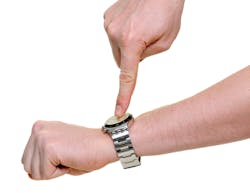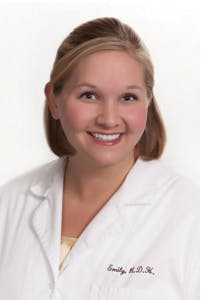By Emily Boge, RDH
January 17, 2014
Dear Emily,
As embarrassing as it is to admit, I think my boss’s smile is holding him back. I feel patients do not trust him to complete their dental work since his own teeth are not in the best shape. I am certain he has not received routine care in a long time. How would you recommend I address this issue?
Maureen
Dear Maureen,
Wow. This is a tough one. Approaching anyone with sensitive dental questions can be tough, but when he or she is your employer it can be even trickier. My first inclination was to recommend that you ask another dentist to approach him, but after mulling it over a couple of days, I have come up with a plan that just might work. First, ask your boss, “When was the last time you had your teeth cleaned?” When he answers, do not judge, simply state that you would really like to clean his teeth for him. If he agrees, use the opportunity to ask him if there is anything he does not like about his smile. By stepping back and allowing him to communicate any concerns, he might open the door to conversation for you. Allow him time to consider the questions; perhaps he has never considered his options. Sometimes talking about things out loud can cause a person to realize what is possible. Remind him how great it looks when he finishes an aesthetic anterior case. If this conversation is ineffective, you can always have it again at his next recall. I recently had a woman choose to complete a large case we had discussed ten times (at least) prior to her decision. Good luck!
Dear Emily,
What is your policy on patients who come late to their appointment? How late is too late to see them?
Carmen
Dear Carmen,
If the patient who has arrived late is a person who is generally punctual, I recommend seeing them, regardless of how late they arrive. If a patient has made the effort to get to the appointment, I find it hard not to reward that effort. Health history gathering, vitals, diagnostic X-rays, and periodic exam can be completed in a smaller amount of time. The patient can then be scheduled for the appropriate amount of time to complete hygiene services a different day.
The bottom line is not spending too much time on analyzing why the person is late and judging if the excuse is “good enough,” but acknowledging the tardiness, explaining that you will do what you can, and moving forward with care. Patients appreciate honesty and knowing you genuinely care. If you allow those two things to be your guiding factors, you will make the right choices in schedule maintenance.
Dear Emily,
Sometimes, as a new hygienist, I ask questions that may seem obvious to some of my peers. I often feel belittled by the snotty attitudes. This leads me to ask fewer questions, leaving me confused about what is the best decision in certain situations. How do you think I should deal with this?
Ellen
Dear Ellen,
Throughout your career you will encounter individuals who speak in a demeaning, mean, or outright unprofessional manner. Dealing with these “haters” is often a multi-step process that is not easy to navigate. I cannot give you a super clear answer on how to navigate this process, but I can tell you what I have done in the past when presented with this situation. Approaching anyone with sensitive dental questions can be tough, but when that person is your employer it can be even trickier.
The first step is to realize that the “hater” may not realize the negative energy they produce. He or she does not remember what it is like to be in your shoes. I am by no means justifying any disrespectful behavior, but recognizing that their negative attitude may not be intentional can be reassuring. You need to recognize that the problem is theirs, not yours. There are many things in this profession that are not learned in school alone. Asking questions is an important part of moving forward as a recently licensed health professional.
My second recommendation is to join a group or organization that will encourage your questions, and help you seek data-supported answers. When I was little, my parents would tell me if someone is mean on the playground, find a more respectful friend to play with. This is again true in your situation. By seeking out more supportive peers, you will notice your work will become more fulfilling, and you will begin to build a network of valuable friendships along the way. Some of my best friends are fellow hygienists that I can call anytime, any day, and know they will not judge.
Maintain an open mind, and find a group that appreciates your desire to grow as a professional. And remember, if a hater has to hate, don’t let them take you down with them.
More "Ask Emily" columns:
Ask Emily: BHT, fluoride options, and parents and pediatric appointments
Ask Emily: Why patients forgo X-rays, why you should stir the pot on infection control, and how dental hygiene school is a lot harder than it looks
Ask Emily: Treating kids, using napkin chains, and paying for your own uniform










